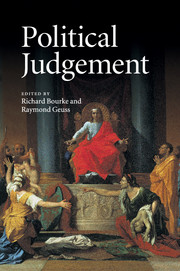Book contents
- Frontmatter
- Contents
- List of contributors
- Acknowledgements
- Introduction
- Part I The character of political judgement
- Part II Trust, judgement and consent
- Part III Rationality and judgement
- 7 Pericles' unreason
- 8 Accounting for human actions: individual agency and political judgement in Montaigne's Essais
- 9 Nehru's judgement
- Part IV Democracy and modern political judgement
- Bibliography of the works of John Dunn
- Index
7 - Pericles' unreason
from Part III - Rationality and judgement
Published online by Cambridge University Press: 26 December 2009
- Frontmatter
- Contents
- List of contributors
- Acknowledgements
- Introduction
- Part I The character of political judgement
- Part II Trust, judgement and consent
- Part III Rationality and judgement
- 7 Pericles' unreason
- 8 Accounting for human actions: individual agency and political judgement in Montaigne's Essais
- 9 Nehru's judgement
- Part IV Democracy and modern political judgement
- Bibliography of the works of John Dunn
- Index
Summary
It is one of John Dunn's distinctive claims that those who make political judgements cannot be sure of what they are doing and that those who reflect on them will be unsure of what they find. We describe our own judgements and reflect on those of others in the language of intentions and consequences and speak as if we could capture these. ‘But we cannot do so in practice. To so do is simply beyond our powers … when we speak and think in these terms, we can very seldom (perhaps never) be doing more than guessing what we are doing. We act in hope and fear, in speculation driven by varyingly pressing motives. We cannot act on knowledge, or, indeed, in large measure, even on comprehension.’
This is right. Political judgement is a species of practical reasoning, reasoning that the world has to fit. It will usually rest on shreds of theoretical reason, reason that fits a world, or has done. But it is not itself knowledge. It cannot be known to be true or false either in advance of the outcome it strives to achieve or after the outcome is known, even if we can be sure that the outcome is indeed its own. The best that one can say of it is that it is reasonable in the circumstances in which it is proposed. Nor are political judgements easy to comprehend. Their reasoning can be complex and obscurely connected. When driven by what Dunn nicely calls the cunning of unreason, they can be more or less completely opaque.
- Type
- Chapter
- Information
- Political JudgementEssays for John Dunn, pp. 203 - 228Publisher: Cambridge University PressPrint publication year: 2009
- 1
- Cited by

